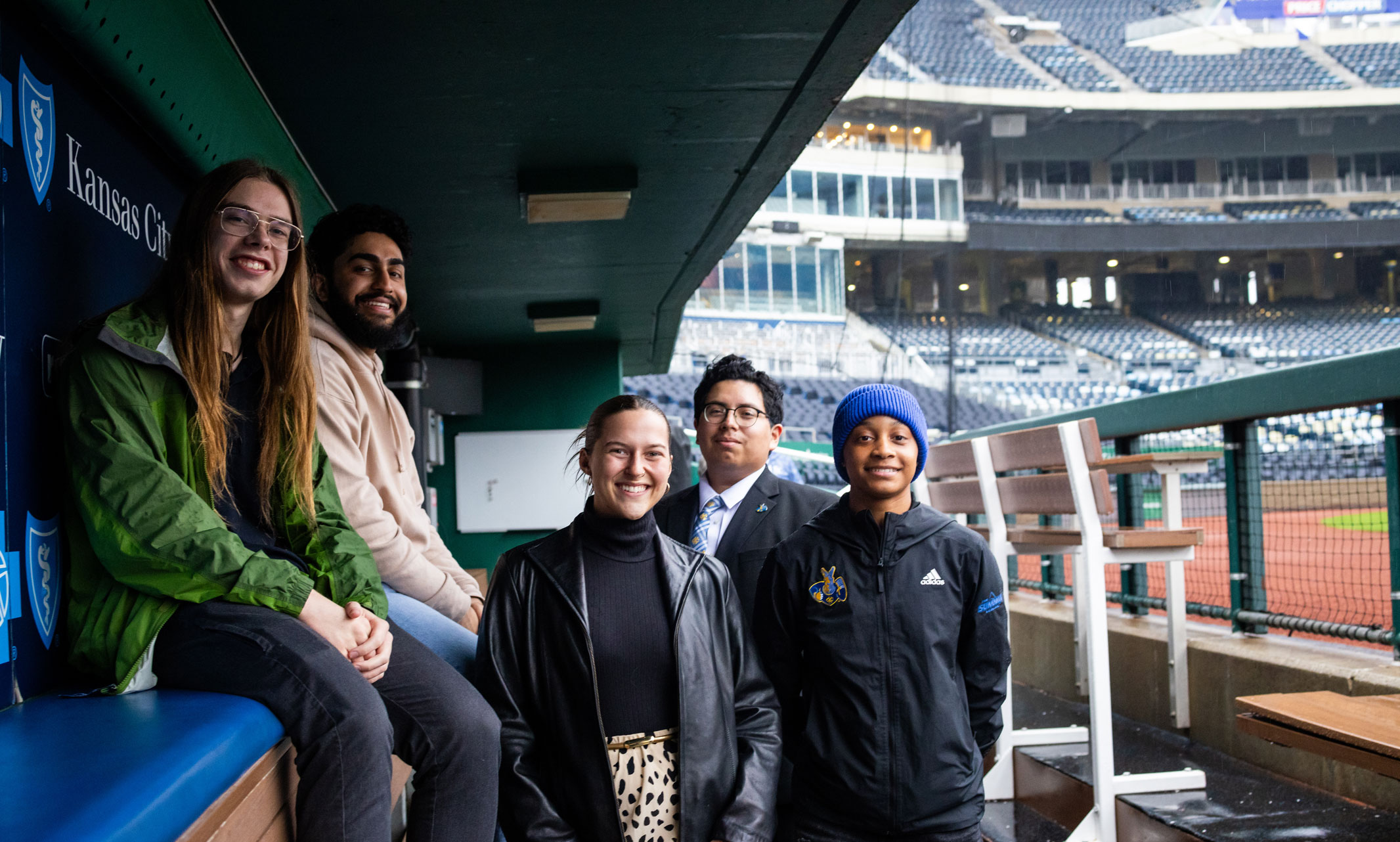
UMKC students’ work will be featured on the iconic Crown Vision screen at Kauffman Stadium
Students studying journalism and film and media arts got a grand slam of an opportunity with Pine Tar Collective, the in-house marketing agency for the Kansas City Royals.
The collaborative effort led to a promotional commercial for the University of Missouri-Kansas City partnership with the Royals on Kauffman Stadium Crown Vision, the almost 9,000-square-foot screen above the outfield.
“It was an extraordinarily unique opportunity to have a chance to go out to Kauffman Stadium and really experience what life at The K is all about,” said Steve Kraske, teaching professor of journalism. “To work with professionals who really know what they're doing, have a very clear idea of how to film this project and get it in the can. It was a great experience for our students to have that opportunity.”
Cristian Martinez, a journalism and film and media arts major, was one student who saw the whole project from concept to screen.
“To work with the Royals on this project was amazing,” Martinez said. “It felt like a dream come true. UMKC, whether it be equipment or the professors themselves, has really prepared us for this moment to be on a set with the Royals. It made us felt comfortable. It made us feel like that we were able to really translate what was what we learned in the classroom to a professional set.”
Students got the MVP tour of Kauffman and Pine Tar workspaces. They met again later where the students were able to pitch concepts to the production team and finalize a plan. After two days of shooting, where students got to be hands-on behind and in front of the camera, Pine Tar edited the final video that premiered at UMKC Night at The K. It will air during every Friday home game of the remaining Royals season.
“All of us we were able to attend and watch our commercial up there,” Martinez said. “The Royals showed us on Crown Vision, which is crazy because I always wanted to be up there. They showcased all of us and it was awesome.”
The prime location and partnerships of UMKC allow for these amazing opportunities that students get to advance their career before they even enter the workforce.
“I think coming to KC, this is what it's all about,” Martinez said. “I think some people like to tell themselves, ‘I want to go to Chicago. I want to go to New York. I want to go to LA,’ when in reality, Kansas City is the place to be. You get so many opportunities, like the chance to work hands-on early in your dream career.”
Jun 28, 2024
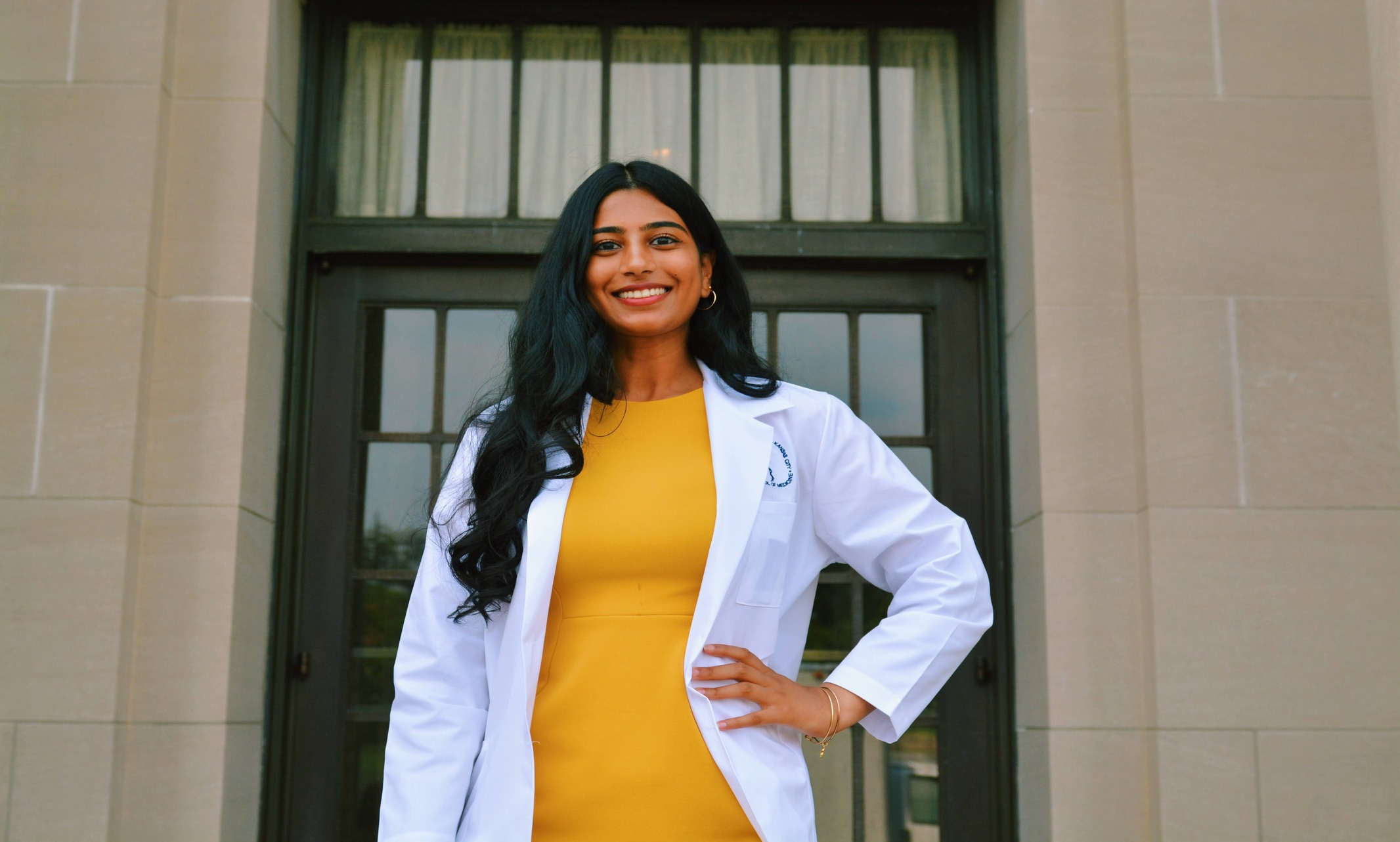
Award recognizes University of Missouri System students for character and collaborative spirit
Rithika Ginjupalli, a six-year B.A./M.D. student at the University of Missouri-Kansas City School of Medicine, has made her mark at the intersection of medicine and public health.
Ginjupalli, originally from India and raised in Colorado, found her love for orthopedic surgery and community public health at UMKC.
Ginjupalli was honored on June 27 at the University of Missouri Board of Curators meeting as this year’s UMKC recipient of the Remington R. Williams Award, which celebrates the life and legacy of late UMKC alumnus Remington Williams (J.D. ’22), who died in a car crash in 2022.
In UMKC Chancellor Mauli Agrawal’s nomination letter, he wrote: “Rithika consistently demonstrates integrity, respect, compassion and empathy in all her interactions. Beyond her academic achievements, she works collaboratively to build and foster environments of empathy and inclusion wherever she goes.”
As a medical student, Ginjupalli has noticed a lack of crossover opportunities for two of her biggest interests: public health and medicine. In addition to her academic duties, she has leaned into public health organizations as much as her schedule allows. With involvement in organizations such as the American Medical Association and the American Cancer Society, she works to effect systematic changes in public health from a medical perspective. She is currently the American Cancer Society’s congressional district lead, collaborating with Congressman Emanuel Cleaver to develop policies.
She also is heavily involved with medical research projects that focus on improving health outcomes through community-based participatory research.
“Each community is different, and that is part of the challenge when approaching systemic issues,” she said. “Community-based participatory research lets you tailor the interventions to each specific community rather than a one-size-fits-all solution.”
In this work, Ginjupalli found her niche in projects that aim to increase health literacy.
“There’s a big gap in health literacy for patients and for a lot of the community members we were seeing,” she said. “It’s an issue that’s everywhere.”
“Rithika has created opportunities for her fellow classmates to learn and participate in these advocacy spaces,” said UMKC Associate Professor Trung Pham, M.D., in his nomination letter for Ginjupalli. “Rithika is an exceptional and diligent student, consistently demonstrating her commitment to academic excellence.”
In 2023 alone, Ginjupalli was given the Diversity, Equity and Inclusion Award by the Association of Women Surgeons and Association of Out Surgeons and Allies, the Community Champion Award and the Award for Excellence in Diversity and Health Equity and the Ida Bamberger Memorial Research Award by the UMKC School of Medicine.
Her celebrated achievements haven’t stopped her from dreaming up more ways to make an even bigger impact. Receiving the Remington R. Williams Award is “just a sign that I’m doing something right and to continue what I’m doing,” she said. “We don’t do this work for the recognition of it. But recognizing public health work is important because it motivates others to enter this space too.”
Next up for Ginjupalli is a temporary move to Baltimore, Maryland. She will spend the next year at Johns Hopkins, earning an accelerated Master of Public Health degree before her sixth and final year at UMKC in 2025.
The Remington R. Williams Award is the highest non-academic honor that a student can receive from the Board of Curators. In addition to being a UMKC alumnus, Williams was the student representative to the University of Missouri Board of Curators (2020-2022), and this award is given to students who embody his legacy of high academic achievement, natural leadership and exceptional care to others.
Recipients are selected annually and will receive a leadership medal to wear at commencement, a $1,000 award and an invitation to be recognized at a Board of Curators meeting.
Jun 27, 2024
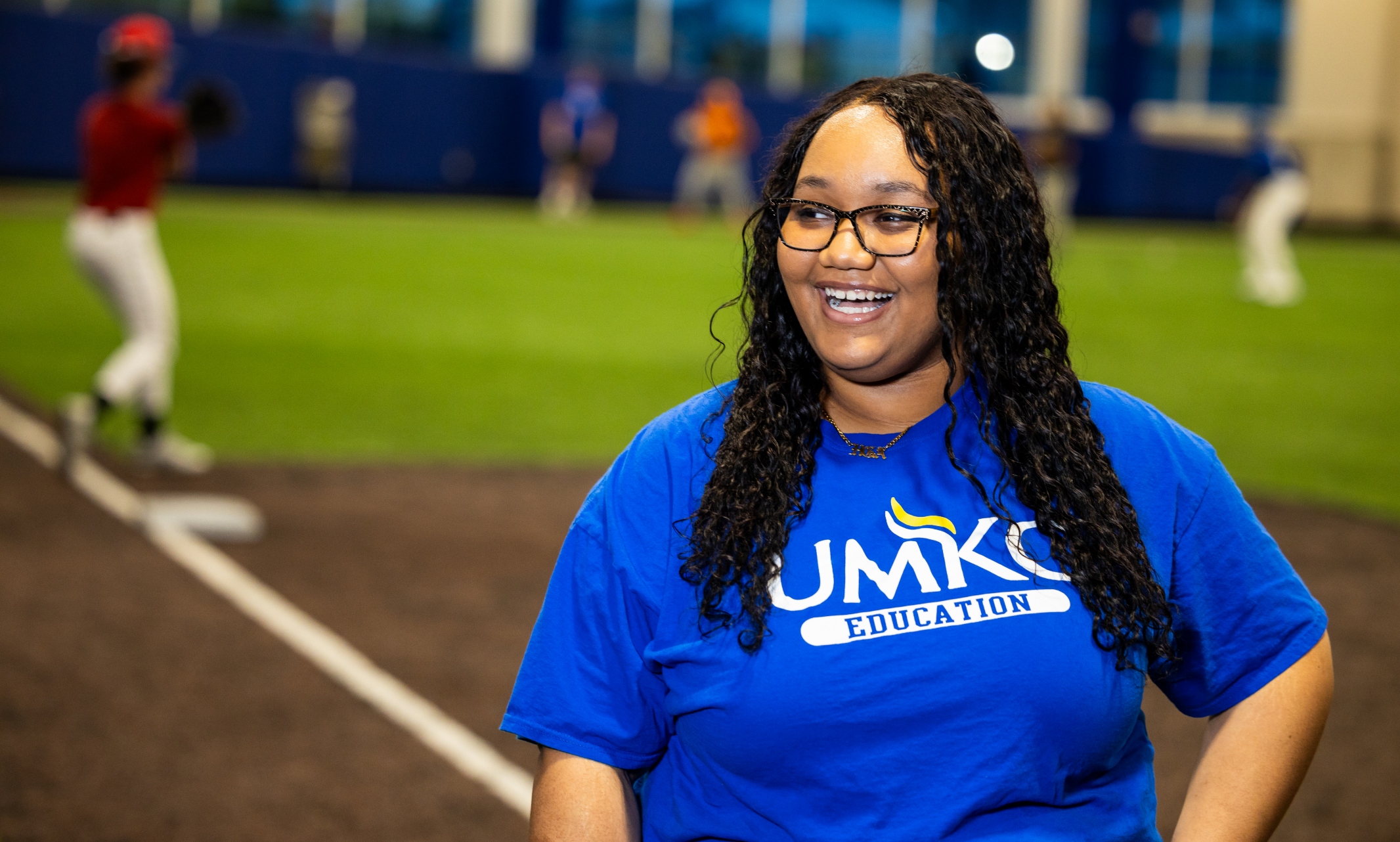
Kayla Tottress has a calling to help children love learning
For most teachers, their classrooms look much the same, desks, white boards and colorful posters. But for Kayla Tottress, the classroom sometimes looks quite different, a turf-and-dirt kind of different.
The junior in elementary education is part of the University of Missouri-Kansas City Institute for Urban Education (IUE), which trains culturally responsive teachers who receive scholarships in exchange for committing to teach in Kansas City-area districts. Among the IUE’s many partners are Major League Baseball and the Kansas City Royals. Together, they team up to help kids in Kansas City enjoy reading and learn a love of the game through the MLB Urban Youth Academy.
“What a great way for our students to get involved in their community because we have a team, the Royals, so not only are they getting to learn about baseball and teamwork, but they have a fun outlet, a place to go while also encouraging them to do well in school,” Tottress said.UMKC students work with local elementary students throughout the year, helping them strengthen their reading skills at “Power Hour” tutoring sessions. At the end of the semester, students get to have a baseball trivia night. The game requires students to read and answer trivia questions to earn their chance to hit the ball. After they get a hit, the game proceeds like regular baseball.
Though it may seem like fun and games, Tottress said it’s important for students.“I think it's very important that students don't get used to just the tedious, mundane task of everyday learning,” she said. “If we can get them to learn and have fun at the same time, we feel like we're doing a good job as educators.”Major-league partnerships aren’t the only experiences Tottress has had in the classroom. She has also participated in Lead to Read, an initiative to read with students. And she’s been a student teacher at Trailwoods Elementary, part of Kansas City Public Schools, also a UMKC partner. Tottress said being in a classroom, having unique teaching and learning experiences and learning from teachers who have different teaching styles have inspired her to think of how she can bring her own style into the classroom.“One of the advantages of being in a city like Kansas City is that I get to see all different types of people that come from all different walks of life,” Tottress said. “I wouldn’t want to teach anywhere else.”Whether it’s teaching in the classroom, tutoring or leading baseball trivia, for Tottress it’s all about connection. In fact, she says that’s why she chose UMKC. From the moment she inquired at UMKC, Tottress said faculty were responsive to her questions and dedicated to ensuring she was supported. “I really sensed that someone wanted me in their program,” Tottress said. “I love that personal aspect and connection of being connected to a college. I hadn't even said yes yet, and they were already setting things up, saying, ‘We want you to be here.’”
Jun 18, 2024
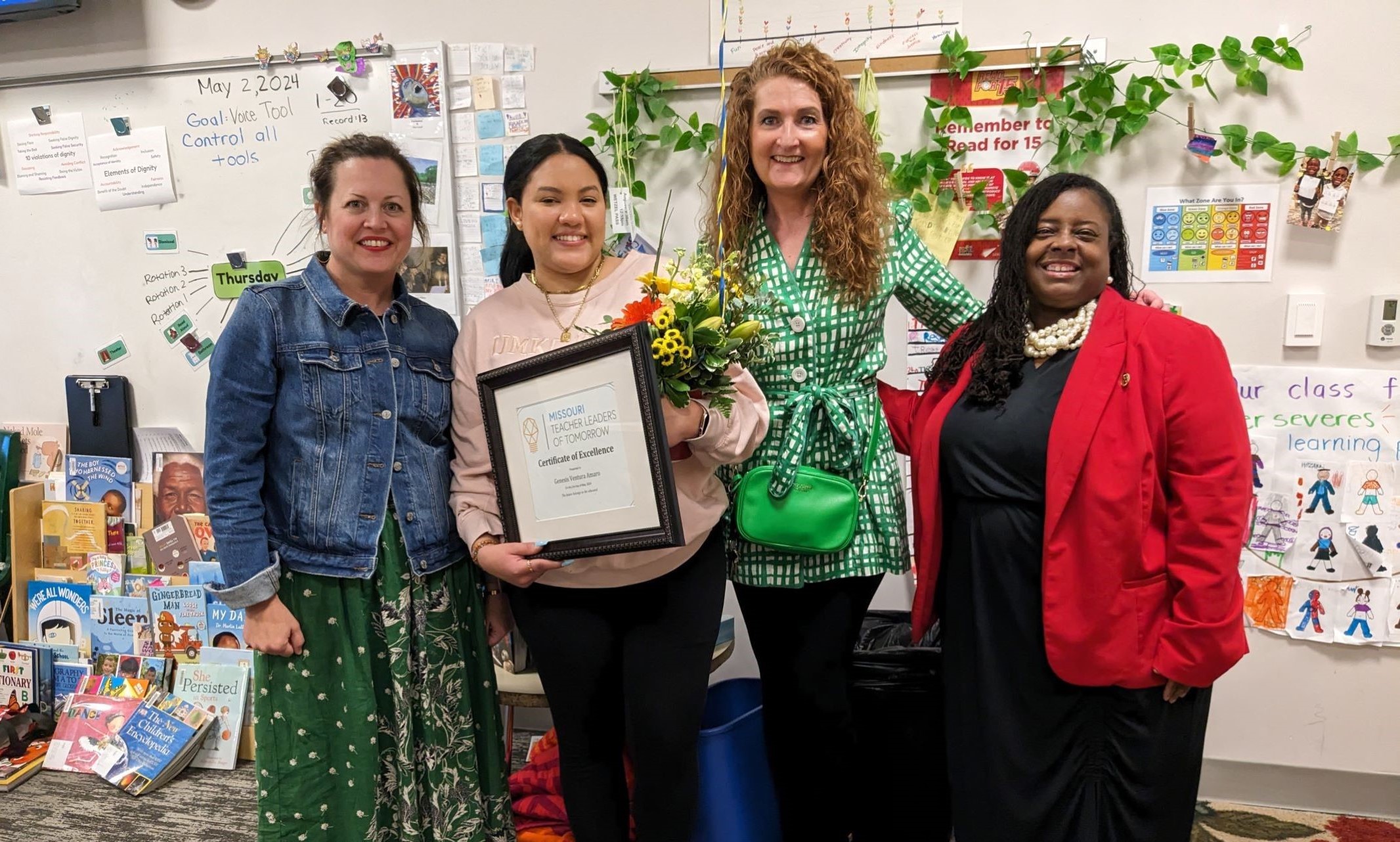
Genesis Ventura Amaro is on track to become an educator who changes lives
Recent University of Missouri-Kansas City alumna Genesis Ventura Amaro is an Institute for Urban Education (IUE) scholar who is committed to teaching at historically underserved schools. She received the Milken Teacher Leader of Tomorrow Award before she graduated, making her one out of only 13 recipients in Missouri.
The Milken Teacher Leader of Tomorrow Award is a recent establishment from the Missouri branch of the Milken Educator Awards program to celebrate and encourage pre-service teachers enrolled in Missouri’s public Educator Preparation Programs. This year, one Kansas City area student teacher had the honor of receiving this award.
Amaro decided to become an educator after she immigrated to the United States from the Dominican Republic six years ago. Amaro attended UMKC to study early childhood education and was an IUE scholar. This means that Amaro received additional training focused on teaching in urban schools and received a scholarship to support her while becoming a teacher; as an IUE scholar Amaro is committed to teaching in Kansas City’s urban schools for four years after graduation. “I loved being a Roo and I am sad that my time at UMKC is over,” she said. “I really valued how much people wanted me to succeed at UMKC. Being a part of the IUE has allowed me to bring in a different, more responsive perspective to the spaces I find myself in. Discussions with my peers, the school I teach at in urban KC and even anybody who would let me talk about the importance of culturally responsive teaching and restorative practices. All of this I have learned through the IUE seminars.”
Amaro’s professor and mentor Jennifer Fergerson nominated her for the Milken Teacher Leader of Tomorrow Award. “Gen has been a really strong student teacher and has thrived as an educator since she began,” Fergerson said. “She truly embodies what an educator is, and it shows in the classroom. It’s really easy to forget that she is student teaching, since she develops skills so quickly and teaches as someone with much more experience than she actually has.” It was no surprise to Fergerson when Amaro was named as a recipient. “I was really proud of her when she won,” Fergerson said. “Especially because right before I found out, Gen was having a conversation with me about how much she loves what she does. It was just so fitting. She truly deserves this recognition.” However, it was a big surprise to Amaro since she didn’t even know she was nominated. “I feel so honored to be a recipient of the award,” Amaro said. “As a student teacher, my focus has always been on what I could do better, so noticing what I am doing well can be challenging at times. It is very rewarding to know that my hard work is being noticed and acknowledged by others as well.”
Amaro completed her student teaching as part of a year-long internship at the Academy for Integrated Arts charter school (AFIA), which is also where she was presented with the surprise award.The Milken Teacher Leader of Tomorrow Award recipients not only get an exclusive network of highly regarded fellow educators, but will also be actively supported during their first year in the classroom. Each recipient will be paired with a seasoned Milken Educator, who is an experienced teacher, as a mentor. The mentor will provide a safe space for the new educator to ask questions, share ideas and gain guidance. “I’m inspired to become a teacher that students can relate to and connect deeply with,” Amaro said. “Even if I can’t change the teaching world, I can change the lives of individual children. I know how important early childhood is, and I am thankful to be blessed with the opportunity of being trusted with so many little minds and hearts to take care of.”
Jun 18, 2024
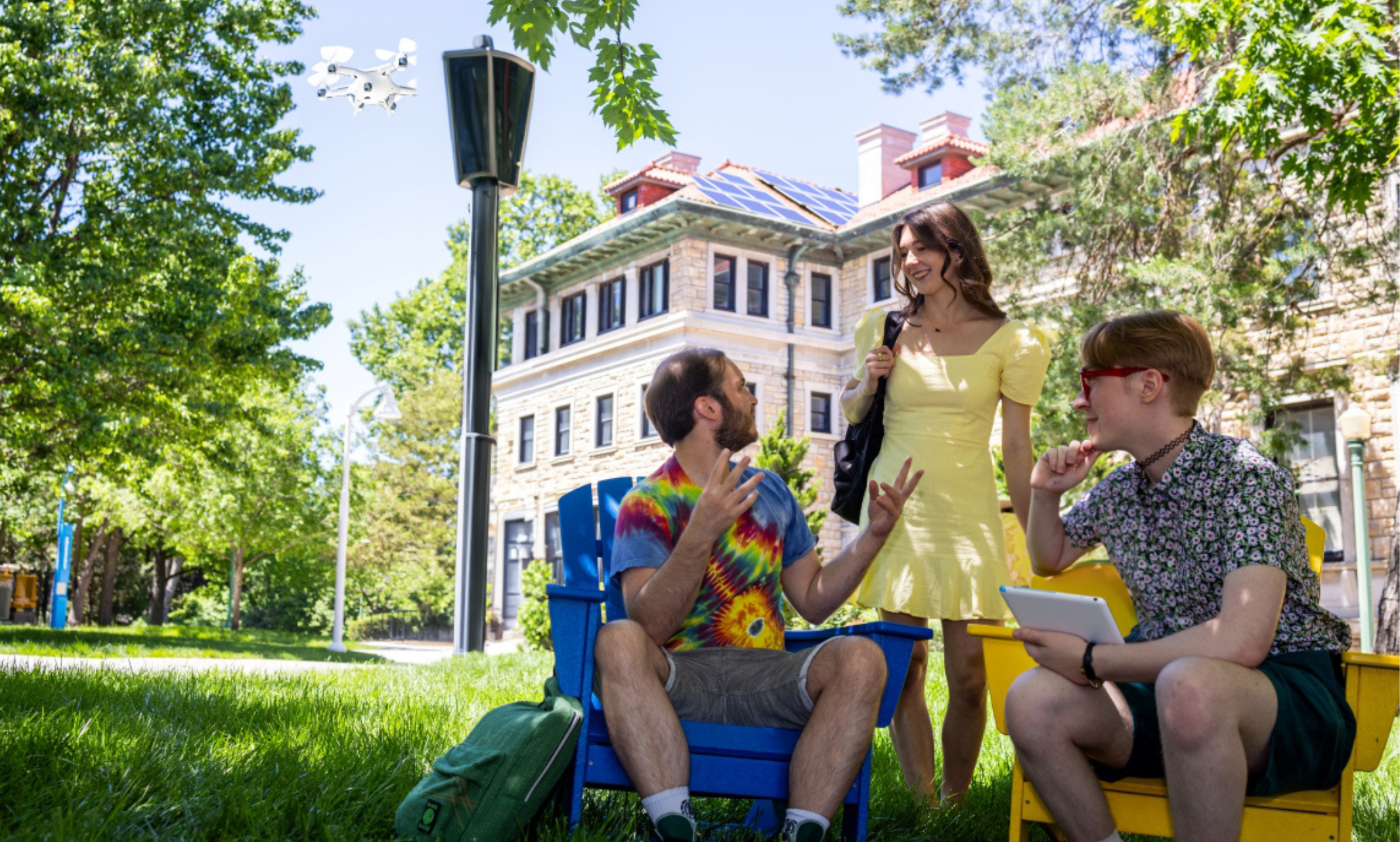
Using AI in teaching and research is just the beginning
Kansas City’s research university is known for being innovative and future-forward. As artificial intelligence engrains itself into our everyday lives, many faculty have been on the leading edge of using this technology in the classroom and in their respective fields. Here’s what professors campuswide are doing to keep up with AI.
School of Science and Engineering
ZhiQiang Chen, Ph.D. is one of the founding chair members of a new American Society of Civil Engineers national committee looking at AI in the classroom. The committee is working to answer the global pressing needs of adopting generative AI into civil engineering classrooms.
In Fall 2023, he developed the first civil engineering AI course offered at UMKC titled “Intro to AI for Natural and Built Environment Applications.”
School of Medicine
Sara Gardner (B.L.A. ’01, M.D. ‘02) is looking at how to incorporate appropriate use of AI in patient care and education.
“Clinically, as our faculty and institutions have adapted and learned more, we understand the utility of AI to recognize small, incremental changes in our patients that could lead to better treatment strategies that ultimately improve patient outcomes,” Gardner said. “Our graduates will likely encounter this technology very early in their post-graduate training, so we are looking for opportunities for them to be exposed to, and learn to respond to, this data on clinical clerkships. Our students also need to understand and become adept at querying these databases, whether that is generating clinical documentation to a complex interpretation of test results specific to the personal characteristics of your patient, to better understand how to interpret these results for their individual patients.”
School of Nursing and Health Studies
Jim Spence (B.A. ’95, M.P.A. ’02, B.S.N. ‘09) interim associate dean for academic affairs, has presented at nursing conferences on AI in nursing education.
Spence is also encouraging both faculty and students to utilize AI in the classroom, whether that is for developing test questions or patient case studies. For patient case studies, AI is able to generate details of the patient’s social history such as name, gender, age, occupation and physical history from lab tests such as neurological assessments and cardiac testing.
School of Humanities and Social Sciences
Antonio Byrd, Ph.D., serves on the Modern Language Association and Conference on College Composition and Communication Joint Task on Artificial Intelligence and Writing, a national task force that discusses humanities interventions in AI and higher education. One such example is creating guidelines for AI policies to honor students' linguist diversity and autonomy.
School of Education, Social Work and Psychological Sciences
Jake Marszalek, Ph.D., interim associate dean and professor of psychology, is investigating the potential outcomes of using AI for learning and education.
Marszalek is a co-investigator on a multidisciplinary grant from Unanimous AI to investigate educational outcomes for a software that enables peer-to-peer collaboration while protecting data privacy and security.
Henry W. Bloch School of Management
Larry Wigger, Ph.D., is currently exploring humanity’s role in increasingly automated workplaces due to AI. With AI automation threatening to displace the lowest-skilled workers, given their predominantly routine tasks, tomorrow’s workforce needs a better way to gain the critical experience to manage and lead. Wigger’s research focuses on how future workers should be equipped with critical thinking skills to employ AI ethically, minimizing negative effects.
School of Law
School of Law professor Ryan Copus, J.D., encourages students to use large language models when writing papers, exploring ideas or completing any other assignments. Copus teaches a course titled “Data, Decisions and Justice,” where he introduces the idea of technically and ethically responsible ways to apply the power of AI to regulate legal decision-making. In this course, students get to code and build their own machine learning model as well as engage in AI research literature.
Jun 17, 2024
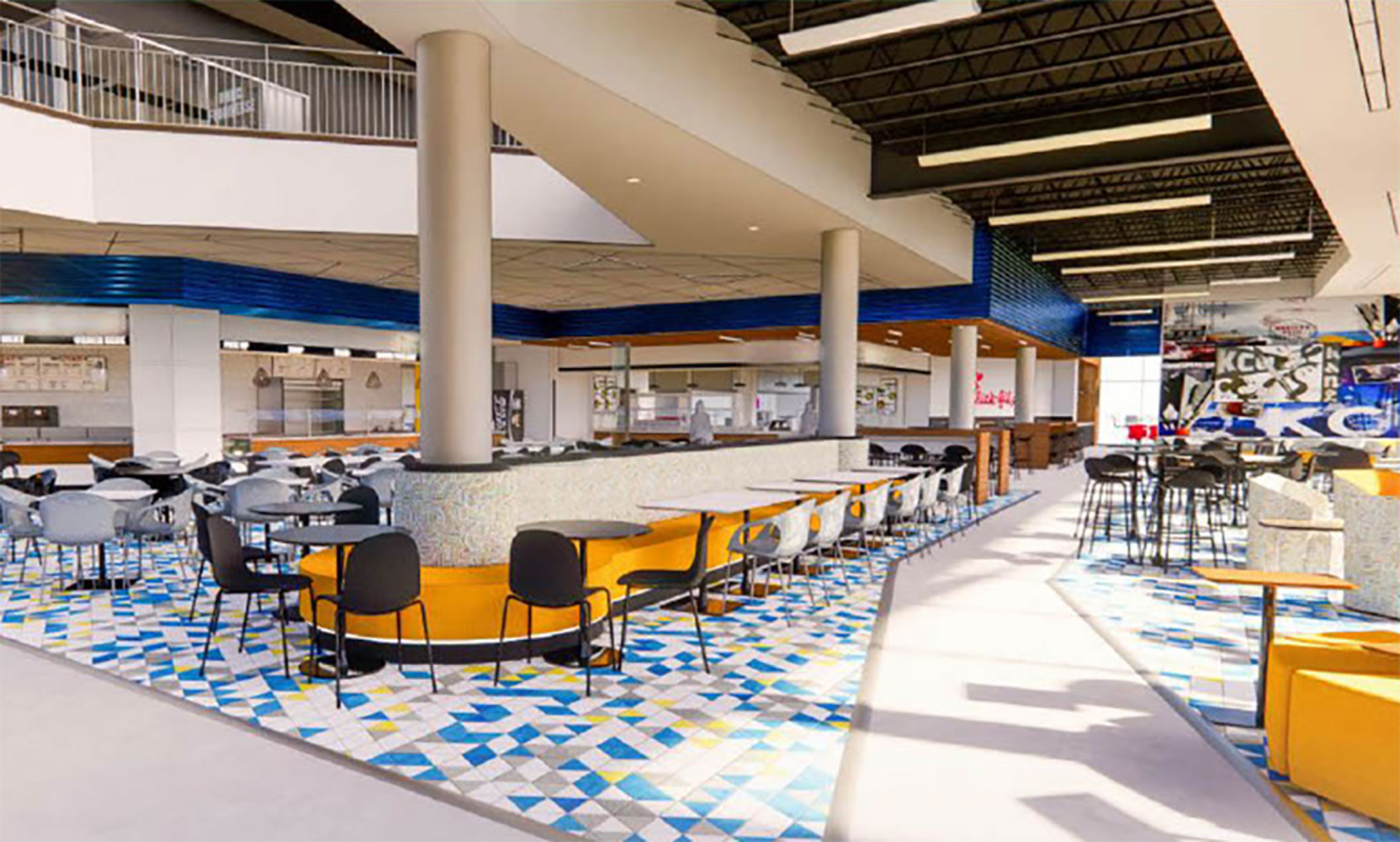
Five new details about the Foodiverse
Construction is underway on new campus dining options at the University of Missouri-Kansas City. In his State of the University address, Chancellor Mauli Agrawal offered a sneak peek of the UMKC Foodiverse.
“This is an exciting addition for our students, our employees on campus and the Kansas City community,” said Jody Jeffries, director of the Student Union. “This will elevate our dining experience at UMKC.”
What is the Foodiverse?
The Foodiverse will be a food-parlor environment on the first floor of the Student Union. There will be eight food concepts, including the full-service Starbucks on the east and a full-service Chick-fil-A that will replace the Chick-fil-A Express on the west. The other six food stalls include:
An isolated allergen-free zone
Pizza and pasta
Deli
Salad bar
Grill
Home-style meals
Additionally, more modern furnishings will be added to both interior and exteriors space at Student Union.
Why is the Foodiverse being created?
The Foodiverse will be closer to UMKC residence halls and centrally located on campus. It also will be short distance from the KC Streetcar stop that is expected to run to and from the UMKC Volker Campus next year.
What is the construction timeline, and will the dining hall remain open at Atterbury?
The construction at Student Union recently started with clearing space, and is expected to be completed in January 2025 for the spring semester. Meanwhile, the dining hall at Atterbury will remain open. When the Foodiverse opens, Atterbury dining services will be closed for renovations to create a new expanded student welcome center at Atterbury.
Will any dining options remain open at Student Union?
Yes, the full-service Starbucks will maintain its normal business operations during construction.
How will meal plans work for students and for the community?
Meal plan holders will engage with the area by visiting one of the six Foodiverse options to compile a full meal from the specific station, and then will be afforded second helpings from any one of the six options during the same meal period. Plan holders will have Meal Exchanges and Flex Dollars associated with their accounts to allow for full retail purchasing at Starbucks and Chick-fil-A. This will be managed through point-of-sale technology.
Jun 17, 2024
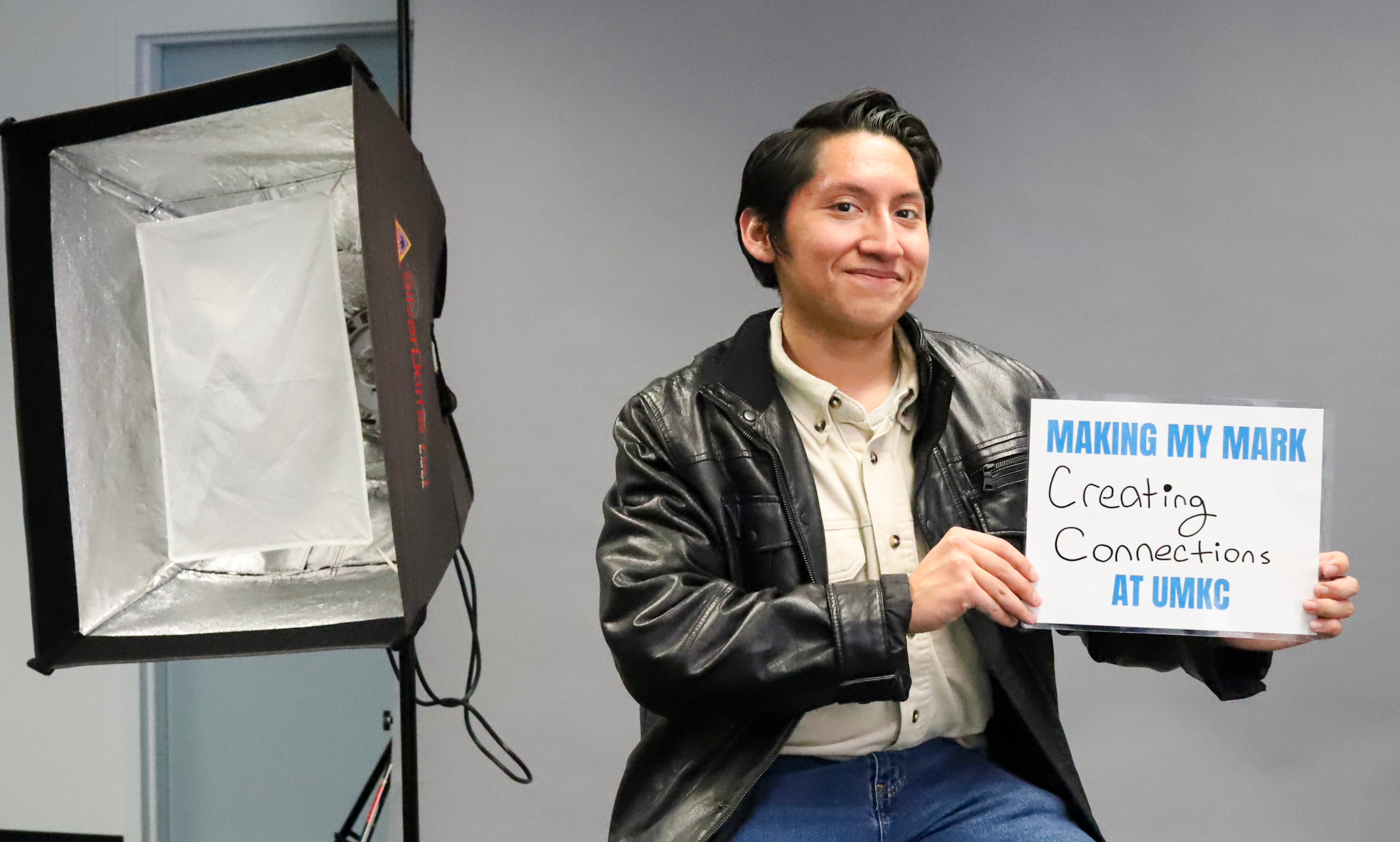
Flexibility and drive allow student to forge professional connections for a greater purpose
At UMKC, students write their own stories, form their own definitions of success and chart innovative career paths. Emmanuel is turning dreams into reality by creating connections in political science and Spanish degree programs and participating in organizations including the Association of Latin American Students and Multicultural Student Affairs.
Emmanuel Fabian Anticipated graduation: 2026 UMKC degree program: Political science and Spanish Hometown: Clarksville, Arkansas
Emmanuel Fabian came to UMKC and found his passions. While studying to be a filmmaker, he discovered his true career goal was to help immigrants in the United States. He changed his major to support that goal but still finds time to hone his art and make connections throughout the university and beyond.
Why did you choose UMKC?
I have a desire for filmmaking, and that wasn't really something that was offered anywhere near me in Arkansas. So, I came to Kansas City. Now that I'm here, I've also learned that I have other interests, and some really dominate. I've been wanting to work with immigrants; see if I can help them out. That’s why I changed my major, even though I am still making films.
How has your college program inspired you?
I try to really get involved, and not just at the university, in Kansas City. I’ve found that it's been very beneficial. I've met a lot of great people.
Who do you most admire?
The people I admire most at this school are all the people that I collaborate with. Some in the Association of Latin American Students, some have been in the Multicultural Student Affairs Office. Some are in the world and languages departments. It's many down-to-earth, great people. They’ve assisted me in so many different ways with my academic career.
Do you have any leadership positions here on campus?
I serve as a public relations officer for the association of Latin American students.. It's beneficial to me. I've been able to meet a lot of great people over there. It’s awesome to talk to everyone, and it helps me balance my schoolwork.
What word best describes you?
Indecisive. That’s something I’ve learned about myself, coming to school here. I've also learned that it just means that I'm interested in many things. Career-wise, it's let me really narrow down my decision on what I want to do in life: helping immigrants.
Jun 13, 2024
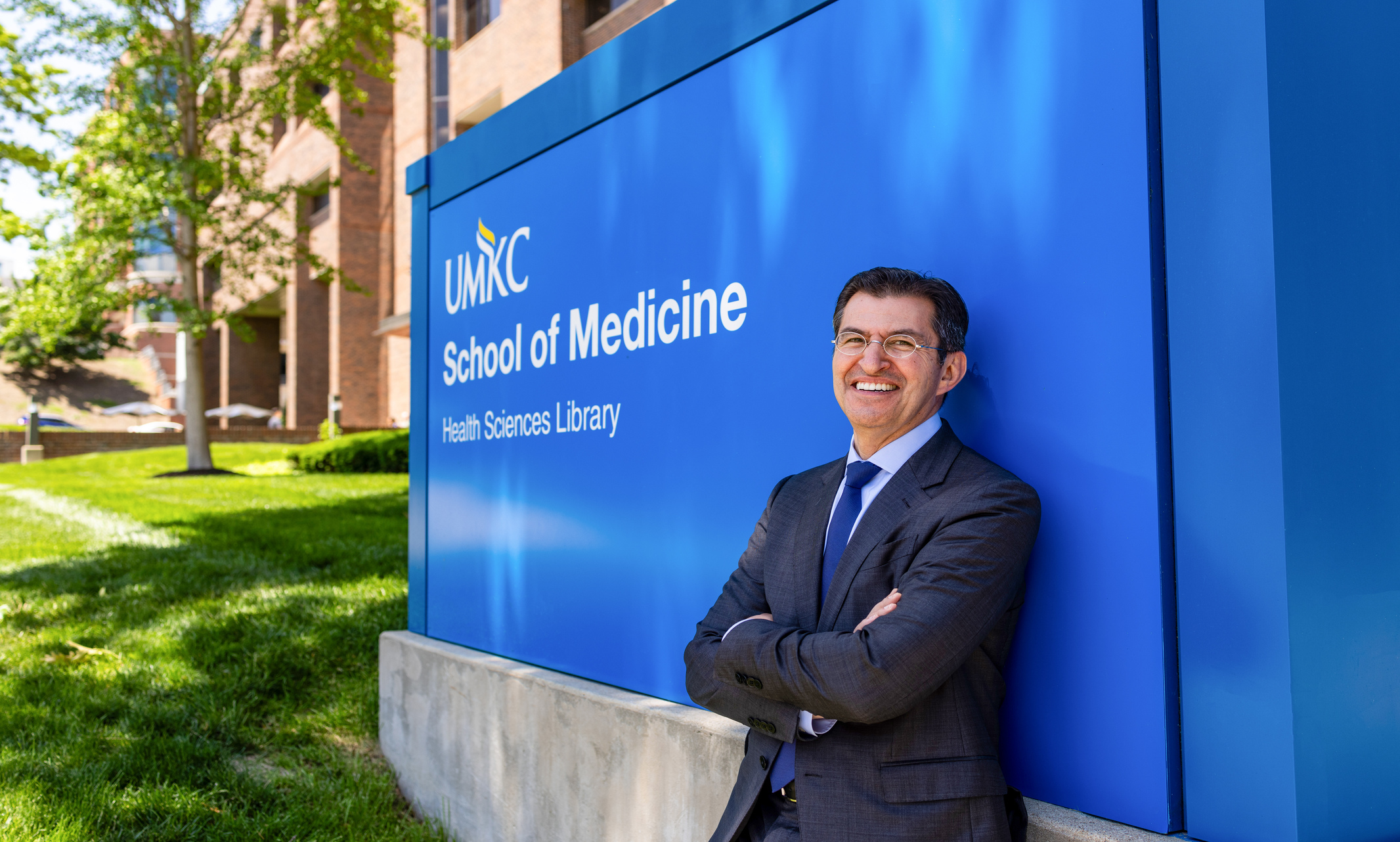
Meet the UMKC alumnus as he takes on a new role
Alexander Norbash (B.A./M.D. '86) has returned to his alma mater as the dean of the School of Medicine.
Previously, he served as the chair and professor of radiology at the University of California San Diego School of Medicine, where he continued to hone his extensive background in research and health-care collaboration.
Norbash joins the school at a pivotal time, with a $120 million Healthcare Delivery and Innovation Building breaking ground later this year and a new $14.5 million medical education building under construction on the St. Joseph, Missouri, campus. He joined the school as dean in March.
What inspired your career in medicine?
My father was a surgeon and the town physician in Platte City, Missouri, for many years. His practice was actually a family business. My mother was the office manager. My little brother and I did odd jobs and filing. This was many years ago before electronic medical records. We saw the patients enter the office with numerous ailments and symptoms, many clearly worried, some visibly with discomfort or pain and others with some level of reluctance. Inevitably, many — if not most — left with a sense of relief and gratitude. This left an impression on us that the work was serious and meaningful. Being a physician’s son also means I heard about the frustrations and limitations of health-care delivery, so I felt that I had a balanced impression of the career. In the end, any frustrations or limitation of the career were offset by the gratitude the practitioner felt for the privilege of alleviating pain and suffering in a fellow human being. Later, when it came time to decide on colleges and a career, the final choice was clear.
Talk about a fond UMKC School of Medicine memory.
My classmates were remarkable. They were brilliant and gifted and energetic, always testing the limits of what we could or should do. For a period of time, we believed that our teachers and professors knew us by the moniker, “that terrible class.” We were always testing the limits of rules, rather than following them. Which I suppose is what you expect with individuals who are adventurous, creative, innovative and want to do things “better.” The respective rules might just go out the window in certain instances.
When I was a student, the units were all alive and buzzing with activity. Students were everywhere, and you could hear laughter and happy conversations in all the halls. We had a full-sized pool table on the fifth floor, and on any given evening, six or seven of us would congregate around the pool table watching our classmates winning and losing. (We) talked about politics, religion, what we were doing and planned on doing and all that lay ahead of us in that long and barely visible road we called the future.
What are your goals for the School of Medicine as dean?
I want to have the best and happiest medical school possible. I want the students to be exceptionally kind, brilliant clinicians, completely satisfied and pleasantly surprised by their experience. I want the faculty and staff to be fulfilled and contributing to a community of innovation and experimentation. I want the community – including Kansas City and our adjoining states – to appreciate this amazing gem for what it is, and what it will become.
You are well-versed in the importance of medicine in rural communities, which is the focus of our St. Joseph campus. What is your vision for that program as it grows?
I had a remarkable rural medicine elective experience in Cassville, Missouri, many, many moons ago. I was struck by the strong independence of my preceptor, who was absolutely on his own for all sorts of maladies and issues presented on a daily basis. Our rural practitioners are not only remarkable physicians, but they are also trusted resources, neighbors and sage advisors. We will do everything possible to ensure our rural practitioners preserve the principles of kindness and sensitivity they are known for, while helping them innovate with advances such as population science, preventive medicine and wearable technology to ensure that rural populations benefit from the innovations that are constantly being utilized and implemented in technology-rich urban settings.
What is something about you that may surprise people?
Before choosing medicine as a career, I considered commercial aviation. To that end, my hobby for the past 33 years has been flying, and for the past 30 years it has been flying helicopters. If for some reason I weren’t a physician, my alternative career choice would have been a coast guard helicopter pilot.
Jun 03, 2024
